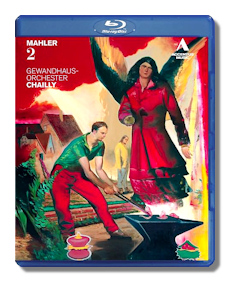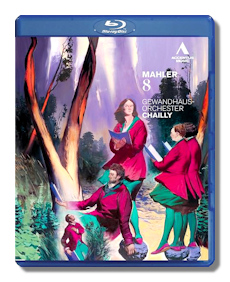
The Internet's Premier Classical Music Source
Related Links
- Mahler Reviews
- Latest Reviews
- More Reviews
-
By Composer
-
Collections
DVD & Blu-ray
Books
Concert Reviews
Articles/Interviews
Software
Audio
Search Amazon
Recommended Links
Site News
 Blu-ray Review
Blu-ray Review
Gustav Mahler

Symphony #2
- Christiane Oelze, soprano
- Sarah Connolly, mezzo-soprano
MDR Radio Chorus
Berlin Radio Chorus
Leipzig Gewandhaus Orchestra/Riccardo Chailly
Accentus Blu-ray ACC10238 95:42 LPCM Stereo DTS-HD Master Audio
Also available on DVD: Amazon - UK - Germany - Canada - France - Japan - ArkivMusic - CD Universe - JPC


Symphony #8
- Erika Sunnegardh, soprano
- Ricarda Merbeth, soprano
- Christiane Oelze, soprano
- Lioba Braun, alto
- Gerhild Romberger, alto
- Stephen Gould, tenor
- Dietrich Henschel, baritone
- Georg Zeppenfeld, bass
MDR Radio Chorus
Leipzig Opera Chorus
Leipzig Gewandhaus Chorus
Leipzig St. Thomas Church Choir
Leipzig Gewandhaus Children's Choir
Leipzig Gewandhaus Orchestra/Riccardo Chailly
Accentus Blu-ray ACC10222 92:19 LPCM Stereo DTS-HD Master Audio
Also available on DVD: Amazon - UK - Germany - Canada - France - Japan - ArkivMusic - CD Universe - JPC
From the early 1960s Leonard Bernstein was a key figure in the revival of Mahler's symphonies, and his recordings of them are still among the very finest. I raise Bernstein and the issue of Mahler's revival because the author of the notes to the Second Symphony here, Peter Korfmacher, refutes the idea that Mahler was largely ignored during his lifetime and up to the 1960s. I well remember that in the 1950s and early 1960s Mahler was a largely unknown composer. Take the well known story about Gilbert Kaplan, the economist who turned conductor after becoming enamored of the Second Symphony. Born in 1941, Kaplan first heard the symphony only in 1965, at a time when there was not a single Mahler symphony cycle in the recording catalogues. (I know – I still have some Schwann catalogues dating back to that era.) Rachmaninov, Stravinsky and Prokofiev, who all came after Mahler were much better known, with frequent performances of their music, even on television. Well, enough said about this: Mahler has come a long way, and one might argue now that his music is actually overplayed, perhaps even overpraised.
Whatever the case, this popularity, not surprisingly, has produced a golden era of Mahler symphony performances – a time in which it seems that almost every major conductor tackles Mahler's music with a sense of mastery, a sense of fully grasping the composer's complex expressive character. Riccardo Chailly is no exception here. The performances on these two Accentus Blu-ray discs are highly detailed in excellent sound and with splendid singing, and are competitive with most of the better efforts. I have a few caveats, however: the finale of the Second is taken at a very slow tempo, and the opening of the Eighth also tends to be on the liesurely side. In the latter case, Chailly is still able to impart a spirited and celestial sense to the proceedings. In the finale of the Second, while the tempo isn't as slow as the 41:20 listed in the booklet (about three-and-a-half minutes of applause are added), it nevertheless stretches the music to near-stasis at times. (More traditional performances clock in around 31 to 36 minutes, although Bernstein in his live DG recording from 1987 is a bit slower than Chailly here and much slower in the whole symphony.) In any event, Chailly makes a good case for his approach, focusing on the religious grandeur and epic character of the music in a reverential rather than spirited or ecstatic way.
The singing in the Eighth by the principals is excellent. Soprano Erika Sunnegardh, mezzo Lioba Braun, tenor Stephen Gould and bass Georg Zeppenfeld are especially good. Soprano Christiane Oelze and mezzo Sarah Connolly are also fine in the Second. The various choirs in both works are excellent and the Leipzig Gewandhaus Orchestra plays accurately and with spirit.
Bernstein's first recording of the Eighth, now on Sony, is still probably the best, although Robert Shaw on Telarc has the glorious voice of Deborah Voigt, making that effort quite worthwhile. (I've heard a ton of Mahler Eighths and no soprano can equal Deborah Voigt for sheer beauty and drama and charisma.) For those wanting video, this one by Chailly will certainly not disappointment. The Second has also had many fine recordings, including by Bernstein (Sony), the aforementioned Kaplan (DG), Litton (Delos) and Mehta (Teldec), but again this effort by Chailly will nicely satisfy most listeners wanting a video performance. As suggested, the sound on both recordings is vivid, and the camera work is excellent.
Copyright © 2011, Robert Cummings





















